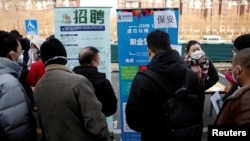The year 2023 should have been the beginning of a new era for China, as Xi Jinping cemented his unprecedented third term as the country’s leader. While Xi consolidated his control over the world’s second-largest economy, China faced many challenges, including a rapid surge of COVID-19 cases and deaths, a historically high youth unemployment rate, and the abrupt removal of two top-level officials.
Some analysts characterize 2023 as a turbulent year for Beijing and say many events that have taken place are part of the lingering effect of China’s Zero-COVID policy, which lasted almost three years.
“A lot of what happened is connected to the zero-Covid strategy,” Dali Yang, an expert on Chinese politics at the University of Chicago, told VOA by phone. “Zero COVID is behind us, but the economic effect of all those policies lingers.”
Chinese authorities’ decision to abruptly end the Zero-COVID policy at the end of 2022 led to a sudden spike in COVID-19 cases and deaths across China at the beginning of 2023. Images on social media showed Chinese citizens queuing for hours outside hospitals.
Later, social media videos, satellite images and footage shot by foreign media on the ground showed how funeral homes were overwhelmed by the sudden spike in deaths. China’s National Bureau of Statistics did not release the total number of deaths in December.
“The sharp surge of confirmed cases and deaths, especially among the elderly, made me realize that the Chinese government doesn’t really care about how its decisions may affect the Chinese people,” Sherry Liang, a 35-year-old English teacher in Central China, told VOA by phone.
Youth unemployment rate
Apart from the surge in COVID cases and deaths in January, China also saw the youth unemployment rate rise to a historic high amid a persistent economic slowdown. For months, China’s youth unemployment rate was above 20%, which exacerbated a sense of despair among the millions of college graduates.
Instead of posting joyful pictures of hat throwing at graduation ceremonies, many young people in China shared photos of themselves lying on the ground, lying face down on stairs, or throwing graduate certificates into trash bins.
The bleak job market has forced some young people to move back to their hometowns and become “full-time children” while others are struggling to maintain a normal lifestyle due to serious mental issues. “I’ve been diagnosed with depression since losing my job in June,” Jacky Wang, a 22-year-old college graduate in Shanghai, told VOA by phone.
“I’m scared about looking for a job. Whenever I open job search websites, I would be very nervous and even have serious headaches. Whenever I read about the latest youth unemployment figures, I wonder if this is how my life is going to be as long as I stay in China,” he added.
In August, China announced that it was no longer releasing youth unemployment data, citing a need to improve and optimize the way data is collected.
Political turbulence, public discontent
While struggling to cope with challenges from the end of the Zero-COVID policy, the Chinese government has also been facing some difficult political moments and growing public discontent about Xi Jinping’s heavy-handed leadership style.
Since July, two top-level officials, former foreign minister Qin Gang and former defense minister Li Shangfu, have disappeared from the public’s view and were later removed from their positions. Widely viewed as Xi loyalists, some observers said their abrupt removal reflects the lack of transparency and accountability under Xi’s one-man politics.
As Xi becomes more heavy-handed in ruling China, tightening control over civil society and cracking down on businesses such as Alibaba, some Chinese people have used occasions like the late October death of former premier Li Keqiang to push back against Xi’s one-man rule, said Alfred Wu, an expert on Chinese politics at the National University of Singapore.
“By mourning Li, Chinese people want to show that they miss the more humane era in China and in a way, they are reacting to the dramatic structural changes that have taken place in China under Xi,” he told VOA by phone.
After Chinese state media announced Li’s death on October 27, images and videos on social media showed hundreds of Chinese citizens lined up outside his childhood home in Anhui province to pay tribute to the former premier.
On the Chinese social media platform Weibo, some netizens called Li “the good premier who devoted himself to the people,” while others said they have always “loved and respected” Li. But soon China’s online censorship protocols blocked relevant search words.
During this year’s celebration of Halloween, some attendees wore costumes such as hazmat suits, which were worn by authorities enforcing COVID-19 rules during the pandemic, while others put blank sheets of paper on their clothes to symbolize the nationwide protest against the zero-COVID strategy in 2022.
With China’s manufacturing activity contracting for a second straight month in November and the country’s economy showing no clear signs of recovery, Wu in Singapore does not expect the overall situation to improve for China in the near future.
He told VOA that while most things will likely remain the same in China next year, “the basic conditions, especially economic conditions, would be worse than 2023.”
Despite the pessimistic outlook for China in 2024, some Chinese citizens think compared to people in Ukraine, who have been suffering from the war launched by Russia for more than a year, their situation seems relatively better.
“While the Chinese government’s authoritarian rule is scary, the war in Ukraine is even more deadly,” Allen Wang, a 37-year-old Chinese man in Jiangsu province, told VOA by phone.





